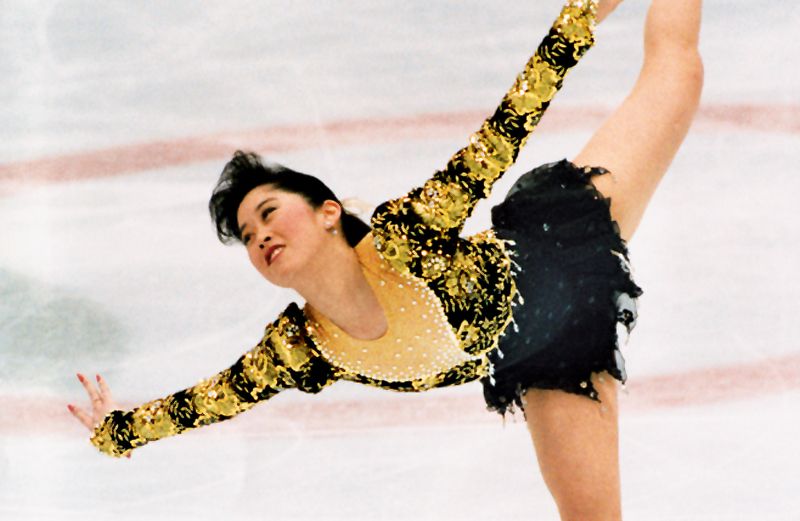It was the men’s figureskating finals of the 1988 Winter Olympics. I was 16 and already had racked up my share of skating titles. Someday I’d be in the Olympics. In fact, it was my dream.
That night I lay on our living room floor excitedly watching the battle of the Brians in Calgary: American Brian Boitano facing Brian Orser in his home territory of Canada. Both of them had been world champions. Both of them deserved to win.
Naturally I was rooting for Brian Boitano, a northern Californian like me. We’d skated on the same ice. I held my breath in amazement. Boitano pulled off an amazing eight triple jumps, almost flawless. The gold medal! I jumped in the air when his score went up.
But what happened next is what I’ll never forget. Brian sat in front of the camera with his coach, surrounded by a crush of journalists scribbling in notebooks, lights flashing, the TV interviewer holding a microphone up to him.
Brian was talking about his career and his medal, talking to the whole world. A tremor went through me, then a terrible sinking feeling. I could never be in the Olympics, I thought. No way could I talk in public like that. I’d freeze. Just the idea of a press conference terrified me.
You see, I loved skating partly because I didn’t have to talk. I could express myself with camel spins, split jumps and spirals. I didn’t have to stand up and give a speech like some teachers expected.
Public speaking was one class in high school I would never take. I could feel the blood rush to my face if I thought a teacher was going to call on me. I stared at my shoes. Please, please, let someone else talk, I’d pray. I was sure I’d get my words jumbled up and make a fool of myself.
What if journalists asked me questions like they asked Brian: “When did you first learn to skate?” “Where did you grow up?” “Tell us about your family.” I’d freeze up like the ice beneath my skates!
And yet, there was so much I would love to say, about my family and all the support they’d given me. About following my dream of being a figure-skating champion.
Why should a dream have some part of it that was so scary? Why would I have to do something I feared in pursuing something I loved?
Then I would fantasize: Maybe if they did a profile of me I could let the pictures speak for themselves, like a slide show.
I could find a snapshot of my maternal grandfather in his Army uniform, the only non-Caucasian in his platoon during World War II. A second-generation Japanese-American, he fought against the Nazis in Europe.
His wife, my grandmother, stayed in an internment camp in Colorado, barracks of rough cabins, families crowded on top of each other. Even with her husband a soldier in the U.S. Army, she didn’t feel safe in the outside world. Anti-Japanese sentiment ran too deep.
“Where was your mother born?” a journalist could ask.
“My mother was born in an internment camp,” I would have to say, “on January 1, 1945.” A New Year’s gift, they called her. I had a picture of the camp.
I would also look for a picture of me as a child: dark-haired, round-faced and my tiny legs and feet in casts. I was born with club feet, pointing inward and curled under. For the first 18 months of my life they were in plaster casts. Then I had to be fitted with special corrective shoes with a metal bar connecting them. I remember the bar clanking on the hardwood floors when I tried to walk. I was quite a sight.
No wonder I yearned to do something graceful when I was finally free of that thing. First it was ballet, then baton twirling. Speechless magic! I could show you a photo of my older sister, Lori, and me with our batons. But what I really wanted was to go ice skating like Lori.
We rented skates and I slid out tentatively on the ice, my mom holding my hands, my legs wobbly and unsure. We made a few turns on the rink, me slipping and sliding. And then something happened. I could do it! I could stand on the ice and skate all on my own.
Something inside of me clicked. This is me, I thought. This is what I am meant to do. It felt like pure grace had found me. I burst into tears when I had to return the rented skates. I thought I’d never get them back!
Every child has dreams. But dreams need to be nurtured and shaped or they’ll fade. My parents encouraged me to take lessons and a group class. I was intimidated by all the other kids, scared when I had to skate in front of them by myself, but I stuck with it.
Teachers, too, saw something in me that I couldn’t begin to see in myself. “Try this,” they urged. “Try that.” A jump, a turn, a figure-eight pattern that cut elegantly through the ice, leaving my marks behind. Things that seemed impossible became second nature.
I was given a Dorothy Hamill doll, dressed in a miniature version of the red costume she wore in the 1976 Olympics when she won gold. Not that I ever thought I would do the same, but a seed had been planted. I had something to aim for.
I took my Dorothy Hamill doll with me to the rink and let her watch me skate.
Of course, it was work, all that training, but as long as you have a goal in your head and you’re working toward it, gaining skills, gaining strength and ability, you don’t always realize how hard it is.
Up at four to get on the ice at five o’clock and train before school. Back to the rink at the end of the day. It wasn’t like school. I never had that feeling of wanting to sink in my chair and hide behind my desk. I didn’t mind being in the limelight in a skating program.
I wasn’t shy Kristi staring at her feet. I was someone else on the ice. Happy, confident, free. Some people express themselves by speaking eloquently, telling jokes or singing beautifully. I expressed myself with my skating. Everything I was feeling inside could come out on the ice.
I worked myself up to a level where I was the Junior American champion and skating in competitions with people I had admired only from afar, like Brian Boitano. That was what was so intimidating about watching Brian in his press conference. He was so calm, unflappable, quick and funny.
I clicked off the TV in a funk. My coach insisted I was Olympic caliber, but I could only imagine falling apart in front of a camera. Live? In front of the whole world?
I would rather die, I told myself. Why would God give me this gift, something I was so grateful for, and then add something that made it impossible?
The next day I was at the rink. As usual. I was practicing a combination of jumps that had once seemed impossible. I could remember seeing others doing them and thinking, I’ll never be able to do that. Almost like having to skate across the ice by myself that first day of class. But look, now I could.
Same thing can happen to you when you talk to people, the thought came to me. A strong, insistent thought.
You can do this, Kristi, the same way you learned to do a triple Lutz and triple Salchow. You didn’t do it all at once. But step by step, you learned. You took a big challenge and chopped it down to bite-sized pieces.
I worked very hard the next few years—on the ice and especially off. After competitions journalists talked to me and although my heart pounded every time I spoke to them, I got to know them. They became familiar faces. And they got to know me.
Slowly I learned that the best approach was simply to be myself. To be honest and gracious and do my best, just like on the ice, to answer their questions. So when my big moment came four years after Brian’s, I was ready.
Sometimes I think my biggest accomplishment at Albertville was not winning the gold but talking to the press afterward. When you do the thing you fear most you put an end to fear.
I am still shy. I don’t love giving a speech, though I am always grateful and honored to be asked. I might look composed and relaxed, but I have to take several deep breaths to calm myself.
I’m glad I have this challenge because it helps me as a mom, helps me remember what my girls are going through, with all the challenges kids face these days.
Fear can stop you dead in your tracks. Fear can kill a dream. But facing a fear is empowering. What are you afraid of? What one thing scares you more than anything else? This year, walk right up to it and conquer it, step by step.
Watch and listen as Kristi reveals the three people who most inspired her!
More stories from Winter Olympians!
Download your FREE ebook, Rediscover the Power of Positive Thinking, with Norman Vincent Peale






